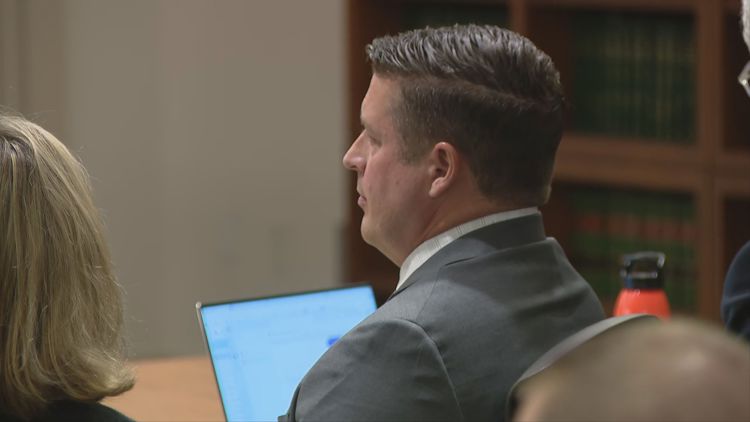KENT, Wash. — The attorneys for Auburn Police Officer Jeffrey Nelson, who was convicted of committing murder and assault while on the job, have filed a motion for a new trial, citing prosecutorial and judicial misconduct.
Nelson shot 26-year-old Jesse Sarey while attempting to make an arrest in front of an Auburn grocery store in 2019. Nelson shot Sarey once in the abdomen and again seconds later in the head after Sarey had already hit the ground. Nelson claimed Sarey attempted to reach for his gun and the knife in his utility vest, but a witness to the scuffle picked the knife up off the ground and placed it on top of a nearby vehicle.
It's not disputed that Nelson killed Sarey — instead, the prosecution and the defense went back and forth in front of the jury about whether the shooting itself was justified under the law. The jury concluded it was not.
In an appeal filed Monday, Nelson's counsel listed what they alleged was a litany of errors that individually and cumulatively rendered any verdict by the jury "invalid."
In court documents, attorneys argued that the state committed "egregious, repeated prosecutorial misconduct," engaged in "improper burden shifting, misstated the reasonable doubt standard, improperly commented on Officer Nelson's right to remain silent, personally vouched for the credibility of one of its experts and impugned defense counsel" in front of the jury.
Nelson's defense also cited what turned out to be a tense moment during jury deliberations as a reason for the verdict to be overturned.
RELATED: Deliberations continue in murder trial of Auburn Officer Jeffrey Nelson after jury complications
After a day and a half of deliberation, the jury returned on one charge and indicated that they could not come to a consensus on the other one.
Judge Nicole Gaines Phelps sent the jury back to deliberate, saying the jury had not been at it for long considering the length of the case and the number of evidentiary exhibits they had to consider. However, Phelps did not disclose to the prosecution or defense that the jury had reached a verdict on one of the charges, on advice from more experienced trial judges.
Nelson's defense counsel called the move "unprecedented," saying that sending the jury back to deliberate instead of accepting their initial verdict was "coercive with the deliberating jury." Nelson's lawyers also took issue with the judge's decision when they learned of it during deliberations and urged her to accept the jury's initial verdict before they had been sent back.
Phelps maintained that she did not suggest the jury decide any particular way and only delivered instructions that they should work to come to a consensus. The prosecution agreed.
Nelson's sentencing is now scheduled for Aug. 13, where the defense's motion for a new trial will also be considered.



